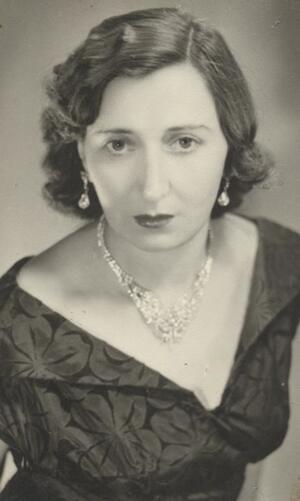Dora Wasserman
Actress, playwright, and theater director, Dora Wasserman (1919-2003).
Photo courtesy of the Segal Centre.
Dora Wasserman created a place for Yiddish theater in Canada by founding a theater and adapting great works of Yiddish literature for the stage. Wasserman graduated from the Rimsky-Korsakov Conservatory in Moscow in 1939. After the war, Wasserman immigrated to Montreal and worked with various Jewish organizations. In 1956 she formed the Yiddish Drama Group, producing plays like Aaron Megge’s Hanna Szenes and Sholem Aleichem’s The Lottery. In 1967, the new Saidye Bronfman Center for the Arts became the permanent home of Wasserman’s Yiddish theater. She began producing musical comedies there in 1968 and began working with Isaac Bashevis Singer in 1974 to adapt his stories into plays. Wasserman was awarded the Order of Canada and a lifetime achievement award of L’Académie québécoise du theatre.
Early Life and World War Two
Dora Wasserman’s love of Yiddish theater accompanied her from the Soviet Union where she was born in 1919, to Montreal, Canada, where she lived from 1950 until her death on December 15, 2003. She was born in Chernikov, Ukraine, the youngest of the five daughters of Motl and Brocha Goldfarb (née Reznick). While still in high school Dora was recognized for her singing talent and in 1934–1935 she attended the Rimsky-Korsakov Conservatory in Moscow, where she was introduced to professional theater for the first time and immediately declared her desire to act. She auditioned for Stanislavski’s Moscow Theater (GOSET) and for the Yiddish Art Theater headed by Solomon Mikhoels. She was only sixteen when she undertook the rigorous course of study at Mikhoels’s school, receiving her diploma in 1939.
Since war had broken out in Western Europe, she left Moscow for her native Ukraine, finding work in a children’s theatre called Tyuz in Kiev. By 1940, using the war as a pretext, Stalin closed most of the country’s Yiddish theaters. Dora and several of her colleagues took a four-week train trip to Jambul, Kazakhstan, where Dora auditioned successfully for the Kazakh theatre. Here she met Shura (Sam) Wasserman, a Polish refugee whom she married on March 8, 1943. Ella, their first daughter, was born in Jambul on January 19, 1944. They survived the war, although Shura lost eleven family members. Dora heard nothing from her family for decades.
Dora, Sam, and Ella joined the stream of refugees moving from one transit camp to another, finally arriving in Vienna. At the Rothschild Hospital Dora and fellow actors and musicians began to perform for the refugees, creating programs and entertaining in various displaced person camps. In 1947 Dora and Sam’s second daughter Bryna was born in Vienna.
Life in Montreal and Yiddish Theater
The Wasserman’s arrived in Montreal on January 21, 1950. Intent on finding work, Dora began to seek a place for herself, approaching Yiddish cultural and community organizations. Her activities were many and varied: recitations in schools, singing for organizations, performing at festivals and conventions. While her connection with visiting and local writers was sustained in weekly literary evenings, she also began to hold children’s theater workshops at the Jewish Public Library, drawing on her experience with the Tyuz Children’s Theater in Kiev. The group of gifted youngsters whom she gathered around her eventually grew into the backbone of her adult company, to which she attracted performers to form the Yiddish Drama Group in 1956.
Between 1958 and 1963 Wasserman mounted many major productions, including Hanna Szenes by Aaron Megged, The Lottery by Sholem Aleichem, Sholem Asch’s Lit. "sanctification." Prayer recited over a cup of wine at the onset of the Sabbath or Festival.Kiddush Hashem and Uncle Moses. Throughout these years the Yiddish Drama Group benefited from the technical, material and moral support of Gratien Gelinas, director of Montreal’s Comédie Canadienne and a leading figure of the French Canadian stage.
By 1964, when Yiddish theater, both amateur and professional, was disappearing the world over, Wasserman determined that her group needed to grow not only in scope of repertoire but in the establishment of a permanent venue. In 1967 the newly-opened Saidye Bronfman Centre for the Arts became a permanent home for the renamed Yiddish Theater.
In 1968 a fertile collaboration began between Wasserman and the composer Eli Rubinstein which made possible the dynamic, large-scale musical comedies that challenged her group and elicited an enthusiastic response from audiences and critics alike. For thirty years Wasserman’s vision shaped the theater, which is now the only resident Yiddish theater in North America. Dora also maintained her commitment to plays with social relevance while creating and adapting new works for her stage.
Later Career, Honors, and Legacy
Between 1974 and 1988 Wasserman worked closely with Isaac Bashevis Singer, adapting six of his works for her company, among them In My Father’s Court (1974), Yentl (1979), Gimpel The Fool (1982) and The Ball (based on The Gentleman from Frampol (1988). In 1992 the Yiddish version of Les Belles Soeurs by Michel Tremblay, one of Quebec’s greatest playwrights, received a dynamic staging, furthering ties with Montreal’s Francophone community.
Among the many honors accruing to Wasserman was the Order of Canada, awarded in 1992. In 2003 she was inducted as a Chevalier of the Ordre National du Quebec. One of her most treasured prizes—a lifetime achievement award of the L'Académie québécoise du theatre—came from her peers in Quebec.
Following a stroke in 1996, Dora officially handed the direction of the Montreal Yiddish Theater to her daughter Bryna. However, her presence was felt as she watched at rehearsals from a wheelchair positioned between the aisles. Dora Wasserman’s contribution to Yiddish and Canadian theater is unparalleled. Indeed, she was the first to demonstrate that a theater of diversity can survive and flourish in Canada, and she did so with an all-consuming selfless dedication to her art.
Larrue, Jean-Mark. “Le theatre yiddish a Montreal”/“Yiddish Theatre in Montreal.” Éditions Jeu, Montreal: 1996.
Cherney, Elena. “Feisty director refused to let the curtain fall on Yiddish.” National Post, July 9, 1999.




